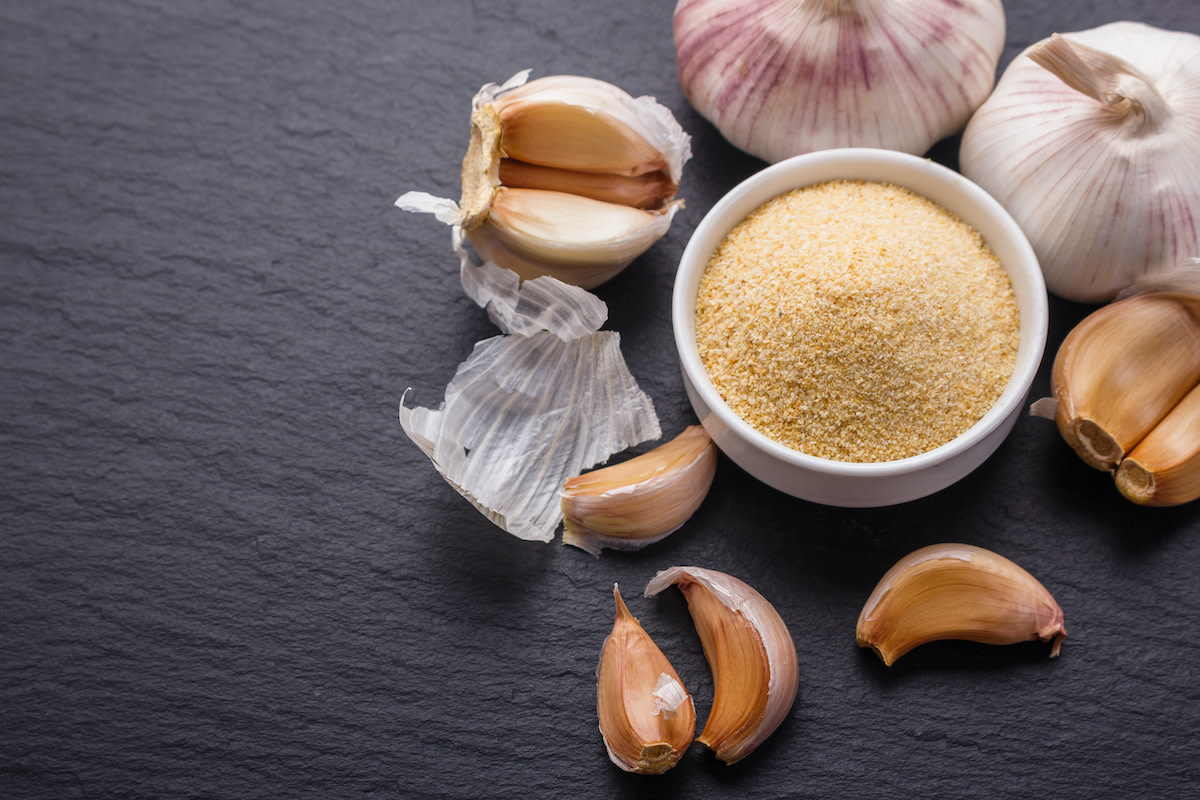Garlic Powder vs. Garlic: What’s the Difference?
Written by MasterClass
Last updated: Oct 6, 2021 • 3 min read
Some recipes call for garlic powder, while others may require a fresh clove of garlic or a whole garlic bulb. Various forms of garlic appear in different cuisines throughout the world. Learn more about using garlic powder vs. garlic in recipes.
Learn From the Best
What Is Garlic?
Fresh garlic cloves (Allium sativum) belong to the same plant family that includes onions, leeks, chives, scallions, and shallots. With an earthy, spicy flavor similar to that of onions, garlic has been a common flavoring or seasoning for veggies, bread, meat, and a host of other dishes for centuries. Even the ancient Egyptians used garlic.
Prior to garlic intake, people usually mince the cloves, make them into a paste, or dry them and turn them into powder to use as an ingredient in marinades, pasta sauces, stews, salad dressings, and spice blends. Sometimes recipes call for intact cloves or even whole bulbs, such as for roasting.
Garlic has a distinct aroma and flavor that can make meals enticing, but eating garlic can also give you bad breath. The ingredient contains vitamin B6 and vitamin C. It’s an anticoagulant and exhibits some anti-inflammatory properties. Garlic also contains a high amount of allicin—an antifungal, antiviral compound.
What Is Garlic Powder?
Garlic powder is dry, aged garlic cloves smashed until it’s as small as granulated sugar or salt. Manufacturers store powdered garlic in an airtight container or shaker to prolong its shelf life.
While a wide array of granulated garlic shakers are available at grocery stores, it’s also fairly easy to make your own garlic powder by drying and then grinding the cloves yourself. You can then add the ground garlic to your spice cabinet so it’s ready to adorn whatever crispy dish you plan on grilling next.
Garlic Powder vs. Garlic in Cooking
Garlic powder adds an intense, concentrated garlic flavor to a recipe, while garlic cloves offer a slightly subtler flavor. If you’re substituting garlic powder for the fresh ingredient, you will need to use very little. Garlic powder is versatile, and you can add it before, during, or after cooking, depending on your preferences, even adjusting as you go. Fresh garlic, on the other hand, is more palatable when it’s cooked, so you rarely incorporate raw garlic into a dish.
If a recipe calls for garlic powder over garlic or vice versa, you would probably do best to heed the advice. That said, it’s sometimes possible to substitute one for the other when you’re cooking, provided you understand the subtleties between the two.
5 Forms of Garlic
In addition to fresh or powdered garlic, there are several more methods of garlic consumption. Here are five ways people eat garlic:
- 1. Dehydrated garlic: Putting garlic cloves through a dehydrator helps shorten the amount of time it takes to prepare and cook. This dehydrated garlic emits flavor quickly in any given recipe.
- 2. Garlic butter: Butter infused with garlic paste or garlic powder can help you streamline applying garlic flavor to certain meals. Garlic bread, for instance, comes together quickly with this melted type of butter.
- 3. Garlic oil: Soaking garlic cloves in olive oil results in garlic oil. Add some of this garlic extract into a pot or pan to infuse your dish with garlic flavor as you cook.
- 4. Garlic salt: Garlic powder combined with table salt produces garlic salt, a seasoning combination that makes for a savory dish.
- 5. Garlic supplements: Manufacturers produce garlic supplements and market them for the treatment of high blood pressure, heart disease, high cholesterol, the common cold, poor immune system function, inflammation, and other ailments. Garlic supplements usually take a pill capsule form.
Want to Learn More About Cooking?
Become a better chef with the MasterClass Annual Membership. Gain access to exclusive video lessons taught by the world’s best, including Mashama Bailey, Gabriela Cámara, Niki Nakayama, Chef Thomas Keller, Yotam Ottolenghi, Dominique Ansel, Gordon Ramsay, Alice Waters, and more.
